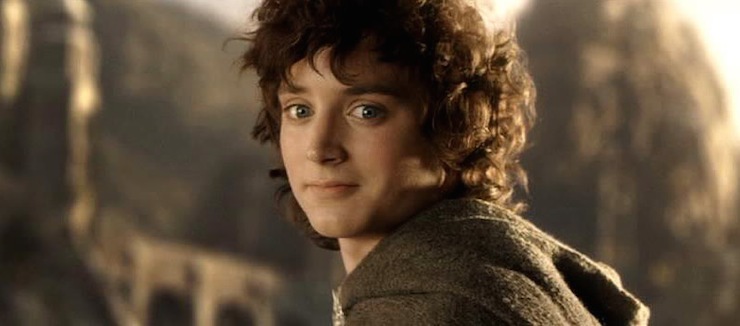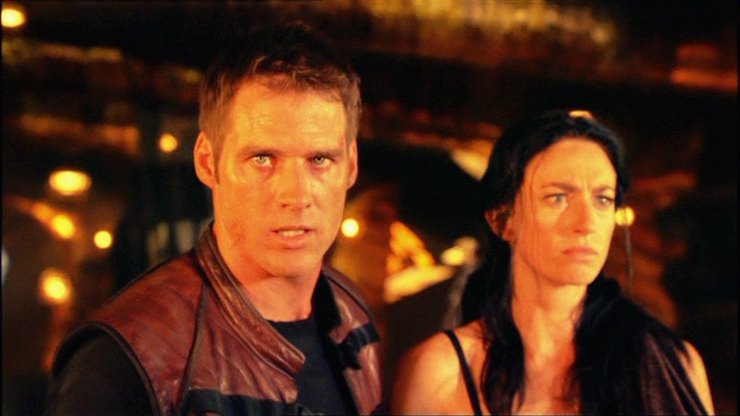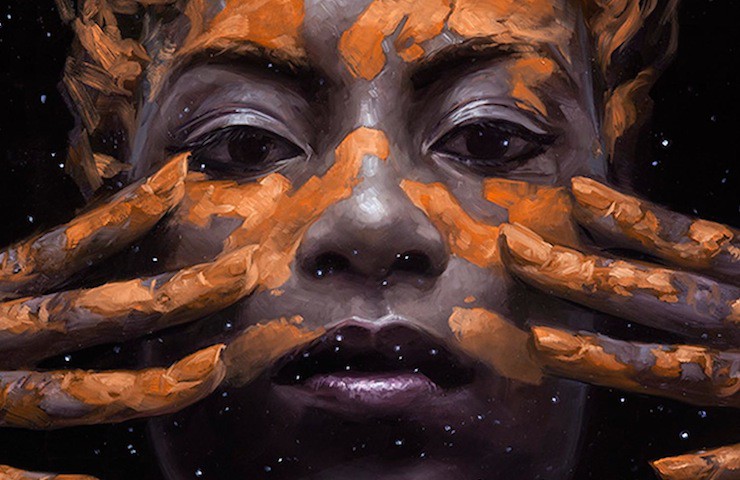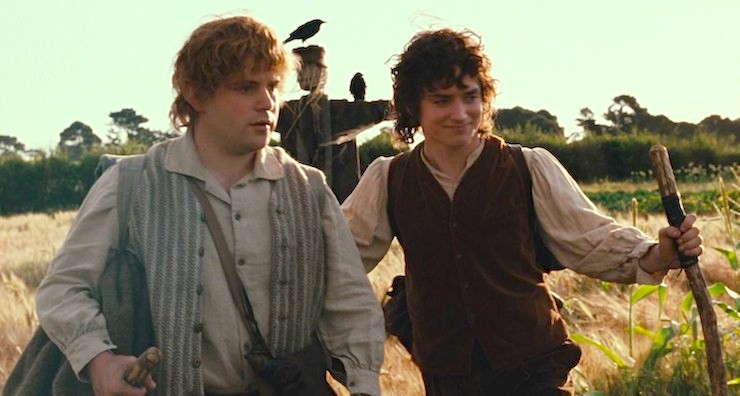You can’t go home again.
It’s a phrase with many meanings, often referring to change as life’s only constant. Sure, you can return to the place you once called home, but it won’t be the same as when you left it. But perhaps the more profound meaning of that saying is wrapped up in the person it pertains to; you are the one who is different. You have transformed into someone who no longer quite fits your home. You’re a warped puzzle piece left out in the rain too long, and now you can’t snap into place. It’s scary to think about… but often fundamentally true. And it’s something that stories can help us come to terms with as we grow, while that vague notion of home seems to slide from our grip.
Some of my favorite tales turn on this theme. I’m not a fan of darkness for darkness’ sake, but the natural, bittersweet flow of life? Stories about those demons are the ones that shake me. When I was young and first closed the back cover on Return of the King, I remember sobbing uncontrollably under a blanket for an hour or so. It was easy to understand why J.R.R. Tolkien had closed his epic with Frodo’s choice to leave for the Undying Lands, an honest reflection of the ways that war and hardship alter one’s life permanently. But the idea of working so hard to preserve your home, only to come back and find that it no longer belongs to you? It was the first time I had experienced a story that so deftly put this idea across.

“I tried to save the Shire, and it has been saved, but not for me,” said Frodo. What I found perhaps most interesting about his realization was that it did not diminish the importance of his home. The fact that Frodo was a hobbit who came from the Shire was the sole reason he was capable of carrying out his quest to save the world from darkness. His heritage had meaning, and he had the good grace not to distance himself from it out of pain that he no longer belonged.
When I was a very small child, I lived in Hoboken, New Jersey. It was only for the first four or five years of my life, but the memories I have of that place are vivid. It was a point in time when I was surrounded by family, when I was a funny little red-headed mascot at the local grocery store, when my father would carry me on his shoulders and I could touch the leaves of maple trees that lined the block. I have only been back there a handful of times since those days, and each time it hurts more profoundly; the town has changed irrevocably (as towns do), and I barely recognize those streets anymore. But though the rent has skyrocketed and the local bars now cater to the trendy Manhattan financial set, there’s an impression of me set firmly into the concrete of Hoboken sidewalks, and I’ll never truly let it go.
In science fiction, I feel that this type of story often has a marked twist; whereas Frodo loved his home, and quickly learned that the perils of adventure weren’t for him, science fiction typically hands us characters who enjoy pushing the boundaries of human knowledge and experience… but end up with more than they bargained for. In that way, the transformative aspect of experience is pushed to the forefront, sometimes quite literally. Those stories hurt in all the same ways that The Lord of the Rings does, but they’re also comforting; they prove our willingness to adapt and survive despite adversity, to withstand transformation—and we all fear our own ability to do so from time to time.

Farscape is inevitably one of my favorite examples of that story. John Crichton begins his journey in a spacecraft he created, doing an experiment of his own design in an attempt to take humanity closer to interstellar travel than ever before. But when a wormhole sucks him into another galaxy and he comes face to face with the endgame of that travel, he inevitably breaks down and reshapes himself. John Crichton effectively loses his mind, and in doing so, makes the journey from geeky astronaut to intergalactic fugitive and hero. He stops a war, he falls in love, he makes friends of a dozen different species. And when he finally makes it back to Earth, he finds that he doesn’t belong there anymore. He’s disappointed at the paranoia of humanity, the way that their fear prevents them from making strides toward a better future. In the end, he chooses to stay with his new family on board the living ship Moya. He calls his father to say goodbye and tells him that he must work to bring the world together—because John Crichton knows that what lies beyond it will test us as a species in every way imaginable.
Arthur C. Clarke’s 2001 offers a similar journey for Dr. David Bowman. A mission to explore Iapetus—one of the moons of Saturn—ultimately leads him to encounter an advanced piece of technology known as the monolith. What began as a simple directive to search for evidence of intelligent extraterrestrial life ends with Bowman transforming into a “Star Child,” an immortal being capable of traversing and living in space. The unknown that he was willing to face quickly turns into an unknown that he could never have foreseen, let alone prepared for.

One of the earliest unknowns I faced was the few years I spent growing up in Hawai’i. I have Hawai’ian family members in my cousins and uncle, and my mother lived there as a young adult and married my father there, so my family took a leap and made a go of things on Oahu. It was easily one of the most miserable points of my life; we were broke, my parents worked nights in addition to other jobs, and I had no real friends to speak of. I was a weird haole girl whose hair was starting to go blond from the sun, who had to take swimming lessons because I hadn’t spent my whole life near the ocean. And yet I can never neglect the importance that Hawai’i has to my family, to my heritage—I was lucky to know those islands, and maybe one day I’ll figure out what they mean to me.
A recent reading of Nnedi Okorafor’s Binti put me in mind of these stories because its themes are one and the same, and Okorafor handles them so beautifully. Binti is the only one of her people to leave home and attend Oomza University, but on her way to school, she becomes the captive of an alien race who have warred with humans before. Through it all, one of her greatest assets is otjize; the red clay of her homeland that she coats her skin with. Though Binti ends up breaking ties with her home faster than she might have anticipated—and transforming in a very literal sense—it is a physical manifestation of home that sees her through a harrowing journey.

And in reality, this happens to many of us; we hold our homes in our hearts even as we get farther and farther away from them (even if we want to get away from them). We don’t love them less so much as recognize the changes in ourselves with greater clarity, the pieces that are incompatible and drive us off in the first place. To wit, I ended up spending the majority of my childhood in the midwest, outside Chicago. And for a long time, when people asked me where I was from, that’s what I would tell them—I made my best childhood friends there, I missed the town where I grew up, I needed a good slice of deep dish pizza now and then. I was a Windy City kid, and I loved how that had contributed to my person.
Yet the longer I’m away, the less relevant it seems. In the time that I’ve been absent from the Great Plains, I’ve come out as queer, I’ve married, I’ve discovered what to do with my odd skill set. I’ve made a whole new family’s worth of friends, and the place where I reside now is the place that currently fits. It’s hard to imagine leaving someday—but then, it’s always hard to imagine leaving home. I know now, in a way that I didn’t when I first read about Frodo’s trek to the Grey Havens, that this is how life tends to work out (I’m probably on my eighth or tenth iteration of belonging someplace), and that every single time I leave it will feel a little bit like dying… and a little bit like transforming into something new. Like Binti’s journey to school, like becoming a Star Child, like leaving the Earth behind for a living spaceship, like saying goodbye to the Shire. We each have the ability to be thousands of different people; it’s experience that dictates who emerges on the other side.
Maybe the next time I have to move on, I’ll think of those stories, and the transition will hurt a little less. (I doubt it.) At the very least, I can rest assured that I’m in good company—leaving home behind is pretty much a prerequisite for achieving something magnificent.
This article was originally published September 22, 2015.
Emmet Asher-Perrin only wishes that stories like these didn’t make her CRY so much. You can bug her on Twitter and Tumblr, and read more of her work here and elsewhere.










